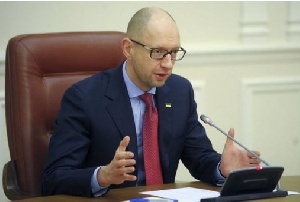Ukraine's Prime Minister Arseny Yatseniuk looked for new allies on Wednesday to shore up his crisis-hit government, after a junior party quit the ruling alliance and another faction signalled it could walk out.
In his first public remarks since surviving a no-confidence vote, Yatseniuk called for a reshuffle in the coalition and said he was in talks with various political groups, including the populist Radical party, about a possible tie-up.
Getting new allies could help Yatseniuk stave off the prospect of a snap election, but he still may struggle to win support for enacting reforms demanded by Ukraine's Western backers in exchange for a $40 billion aid package. Months of squabbling in the coalition came to a head on Tuesday when President Petro Poroshenko, who leads the largest party in the alliance, called for Yatseniuk to resign. Yatseniuk survived the no-confidence motion that followed but the majority of Poroshenko's lawmakers voted against him.
A self-described "kamikaze" prime minister who came to office in 2014 determined to pass unpopular austerity measures, Yatseniuk now risks becoming the lame duck leader of a country battling a deep recession and a pro-Russian separatist conflict.
"It has become absolutely clear that it is essential to reshuffle the coalition and (make) changes to the coalition agreement," he said in a televised government meeting.
The Fatherland faction, led by former prime minister Yulia Tymoshenko, quit the coalition earlier on Wednesday.
"The prospects for an effective reform programme being implemented by the current political elite are close to nil," said Daragh McDowell of risk consultancy Verisk Maplecroft.
The Radical party opposes many of Yatseniuk's reforms, such as cuts to energy subsidies and pensions. It was part of the ruling alliance until September but quit in protest over laws to grant a special status to eastern territories claimed by pro-Russian rebels.
Radical party leader Oleh Lyashko said he preferred a new coalition to snap elections, especially in light of Ukraine's standoff with President Vladimir Putin's Russia over the annexation of Crimea in 2014.
"A war amongst ourselves in Ukraine plays into Putin's hands," he told reporters.
Tymoshenko's party has 19 seats in parliament. Even after its departure, Yatseniuk still has a majority. His coalition now contains his own party, President Poroshenko's party and the Samopomich (Self-help) party, created after the 2013-2014 protests that toppled the previous pro-Russian president.
The Radical party has 21 seats in parliament.
One lawmaker from Samopomich said his party was debating a "dissolution of the coalition of Ukraine's kleptocrats", suggesting they might walk out too.
LAME DUCK
Two years after the "Maidan" protests, Ukraine's economy is still shrinking, the hryvnia currency is hovering around 11-month lows and the separatist conflict, which has claimed more than 9,000 lives so far, shows no sign of ending.
Kiev's failure to tackle corruption and implement reforms has prompted the International Monetary Fund to withhold the next tranche of aid, worth $1.7 billion, part of the $40 billion Western aid programme.
Yatseniuk's government has struggled to tackle bribe-taking in the judiciary, to sell off loss-making state companies and to pass a law giving more autonomy to the eastern Donbass region. The latter is a key part of a ceasefire deal agreed with Russia in Minsk last year.
"Snap elections are now becoming a reality ... It was incredibly hard work for the government to get laws through parliament even before all of this, but now even more so," Olha Chervakova, a lawmaker from Poroshenko's bloc, told Reuters.
A source from the bloc said: "There's a big risk we won't get the money from the IMF. After what happened yesterday who wants to do business with a lame duck?"
General News of Wednesday, 17 February 2016
Source: Reuters













